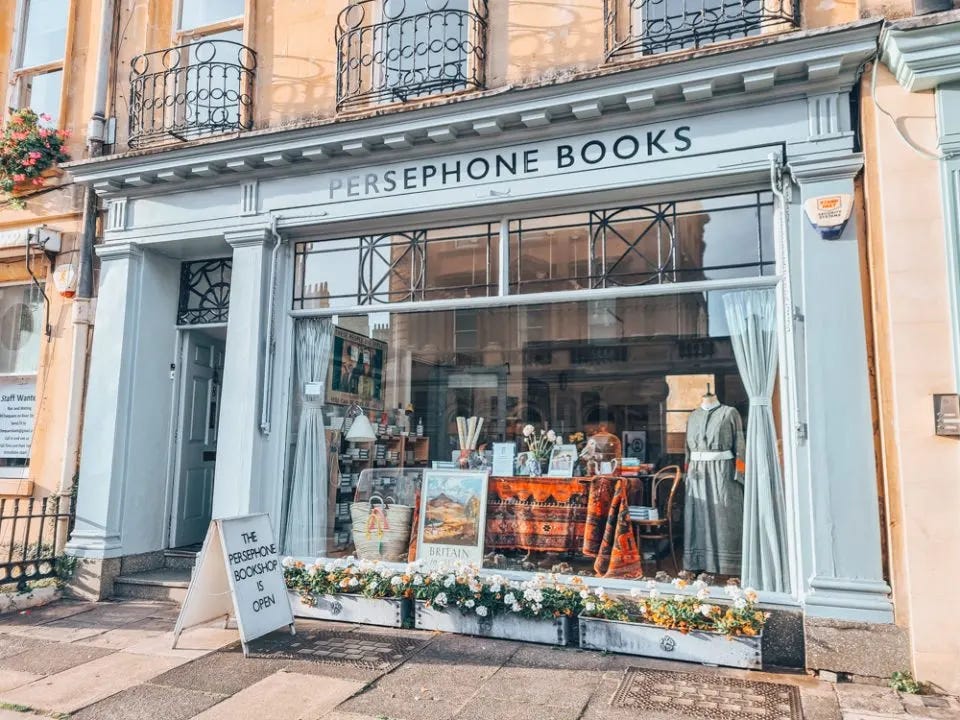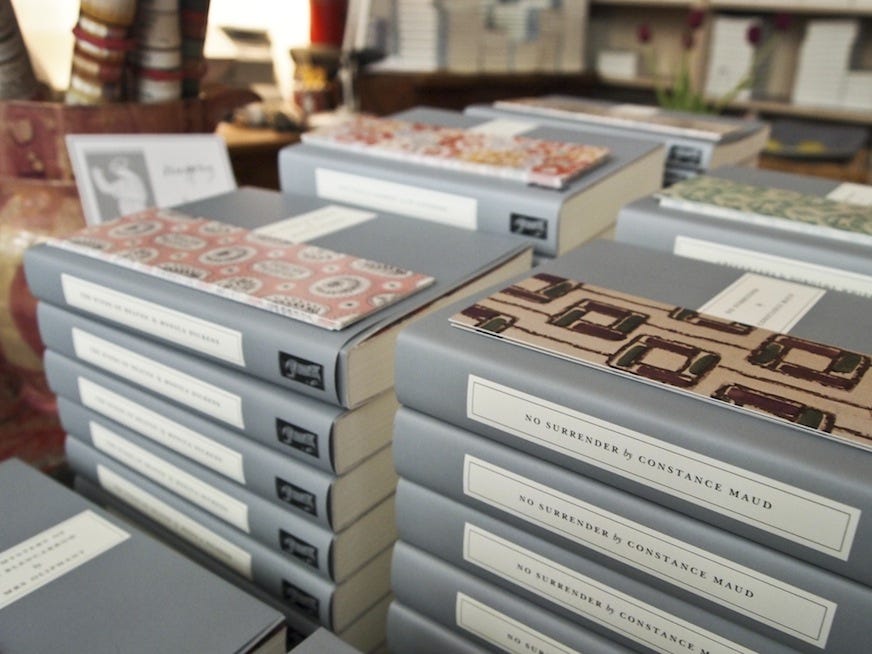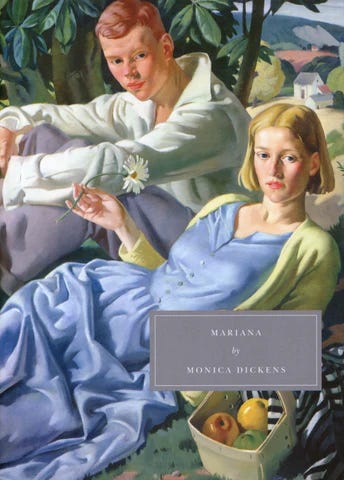First: Special thanks to the Literary Fiction Readers who have come aboard!
Notes/reminders:
I post every 7-10 days. I like the lists to look like lists, so the background stuff goes into notes, which will pop up if you’re on a laptop, but otherwise you’ll have to scroll down—not ideal, I know, but this is the compromise I’ve settled on.
One of the ongoing projects: The Birth Year Project.1
About today’s post, if you’re new: I like puzzles, challenges, games—and since I have my own life-long reading project [which you can read about in the first three posts when I started last year2], I call some of this Substack’s lists “reading projects” or “challenges.” Do I expect you to drop everything and dive into one of these?3 Realistically, I hope you make the acquaintance of some new titles, and I hope seeing a book in relation to certain other books gives you a keener sense of context. In short, I pretend you’re in the market for a reading project even if you’re not. No harm, no foul.
Persephone’s a great bookshop and press from Bath in the UK. They specialize in reprinting high-quality literature, mostly from the first half of the 20th century, mostly by women, mostly British. They make lovely artifacts. The catalog alone is a treat—downloadable, beautifully laid out, lavishly cross-referenced and searchable.
https://persephonebooks.co.uk/
Today’s post is unusual in that although I’ve read a handful of the Persephone writers,4 I’ve read none of the books on today’s list [curated from the catalog, with help from Katie Lumsden @ Books and Things5 —indefatigable reader, promoter of Victober, and novelist].
For each I’ll include their theme/subject tags from the catalog.
No Surrender, Constance Maud (1911) [suffragettes, politics, single women, women’s place, working women]
Fidelity, Susan Glaspell (1915) [abroad, adultery, America, love story, sex, single women]
Despised and Rejected, Rose Allatini (1918) [history, love story, men (books about), politics, sex, WWI]
The Home-Maker, Dorothy Canfield Fisher (1924) [America, family, gender and race, mothers, politics, woman and home, women’s place, working women]
Expiation, Elizabeth von Arnim (1929) [adultery. family, house and garden, humour, love story, sex, social comedy, women’s place]
Diary of a Provincial Lady, E M Delafield (1930) [humour, social comedy]
Out of the Window, Madeline Linford (1930) [love story, sex, woman and home, young love]
Cheerful Weather for the Wedding, Julia Strachey (1932) [Bloomsbury, social comedy, young love]
The Hopkins Manuscript, RC Sherriff (1939) [sci-fi, men (books about), men (books by), social comedy]
Mariana, Monica Dickens (1940) [education, love story, social comedy, teenagers (books for), young love]
Saplings, Noel6 Streatfeild (1945) [family, mothers, sex, widows, woman and home, WWII]
To Bed With Grand Music, Marghanita Laski (1946) [adultery, mothers, sex, WWII]
The Blank Wall, Elisabeth Sanxay Holding (1947) [abroad, America, mothers, thrillers]
Someone at a Distance, Dorothy Whipple (1953) [adultery, family, love story, sex, woman and home]
One Afternoon, Siân James (1975) [family, love story, mothers, sex7, woman and home]
Here’s their note on a select group of titles:
Persephone Classics
We have re-issued fourteen of our bestsellers in more 'bookshop-friendly' editions i.e. paperbacks with pictures on the front. The text and paper is identical to that used in the 145 grey Persephone books, but because the Classics do not have the full-colour endpapers, they retail at £11 each instead of £14.
Persephone catalog: https://persephonebooks.flywheelsites.com/catalogue/index.html
Final thought:
Like Charco Press,8 Persephone focuses its attention: fiction by British women from late 19th century to mid-20th (mostly). These books aren’t contemporary, but they’re modern. Their time feels just beyond reach (it’s the time of my parents and their parents—for you, perhaps, it’s a generation or two farther back). There’s not the otherness you feel reading Victorian novels. In Trollope’s books, for instance, people marry and have families, etc., but in the seven I’ve read sex isn’t so much as hinted at. In the Persephone Books era we have cars and cigarettes, airplanes, movies and radio, booze, science-based medicine, women in the workplace, women beginning to have actual options and, yes, sex lives (along with their complications).
I guess it’s the sense of an era and its literature just slipping away that haunts me.
As I’ve said in other posts, when we’re younger readers/writers we’re hot for what’s new; we need to feel connected to it, we have bad cases of FOMO—what if we don’t know what’s going on! That fear never quite leaves you, but it fades, gets intermingled with other ways of seeing things, including the understanding that every generation has its hipsters and geniuses, its literary hangouts and all the rest of it.9
The Project/Challenge:
We’re keeping things très simple this time: Page through the Persephone catalog, pick out three titles from writers you’ve never read, read them. Me, I’m thinking Saplings, The Hopkins Manuscript,10 and To Bed With Grand Music. (Or Susan Gaspell’s Fidelity.)
If you turn up anything wonderful don’t keep the news to yourself, OK?
Note:
This week I added an Index the posts labeled Reading Projects (on the home page navigation bar).
You can also check them out below:
Reading Project [9]: You Are What You Read
Reading Projects [8]: The Unread
Reading Projects [supplemental]: Reality/Nothingness/Quantum Foam
Reading Projects [7]: Oddball Novels
Reading Projects [6]: Victober!
Reading Projects [5]: The 1920s
Reading Projects [4]: Speculative Fiction
Reading Projects [3]: Big Hard Novels
Reading Projects [2]: Guilty Pleasures
Reading Projects [1]: The 1930s
Birth Year Project:
You supply your birth year, I tell you what came out that year, the bestseller/well-known titles first, then other notable books, then the ones I recommend. If your year's already been done, I'll update. So far, we’ve done 17 years, between 1944 and 1989. The next two in the hopper are 1958 and 1986. The earliest few are scattered among the regular posts, then I figured out how to give them their own shelf—see navigation bar on home page.
Extra credit: You read one of the books (ideally one you're unfamiliar with), then tell me what you thought. If we get enough of these, I'll aggregate and post.
Yes! Of course!
Instead of a Letter [memoir], Diana Athill (1963)
The Expendable Man, Dorothy B. Hughes (1963)
Daddy’s Gone A-Hunting, Penelope Mortimer (1958)
South Riding, Winifred Holtby (1936)
To the Lighthouse, Virginia Woolf (1927)
Mrs. Dalloway, Virginia Woolf (1925)
The Garden Party and Other Stories, Katherine Mansfield (1922)
Effie Briest, Theodor Fontane (1895)
Miss Marjoribanks, Margaret Oliphant (1866)
Katie Lumsden:
https://www.youtube.com/@katiejlumsden
https://linktr.ee/katiejlumsden
https://bookshop.org/p/books/the-secrets-of-hartwood-hall-katie-lumsden/18634480?ean=9780593186923
Noel Streatfeild: Was a woman. There should probably be an umlaut over the e in Noel [as in Brontë] . . . and that’s not a typo in her last name. She was a prolific writer of children’s books, which so consumed her writing life that she managed to squeeze out only sixteen adult novels and five nonfiction books. Well, and twelve adult novels under the name Susan Scarlett. Read about her here:
https://en.wikipedia.org/wiki/Noel_Streatfeild
And about Saplings: https://en.wikipedia.org/wiki/Saplings_(novel)
Sex: Huh, does it seem like this subject tag is turning up a lot in this list? I dunno, must be a statistical anomaly.
Charco: Based in Edinburgh, Scotland. Publisher of slender novels/story collections in translation, from South America, mostly Argentina. Like Archipelago Books, The New York Review of Books Press, Europa Editions, and Persephone, they use a uniform book design, which lets you spot them easily, spine out, on bookstore and library shelves. Many of their translators have won awards.
https://charcopress.com/
Here’s a good one to start with:
Elena Knows, Claudia Piñeiro (2007). Charco edition translated by Frances Riddle (2021).
https://charcopress.com/bookstore/elena-knows
Every generation has its . . . : This idea is at the heart of Woody Allen’s Midnight in Paris (2011), but it was Rosemary Ashton’s fascinating account of the Westminster Review’s flock of literati that most recently drove this home for me—42 Strand: A Radical Address in Victorian London (2006).
The Hopkins Manuscript: Sci-fi, an outlier for Persephone. I just finished it. Like On the Beach, Nevil Shute (1957), it’s about the run-up to an apocalypse the population knows is coming. Shute’s novel stops before the world ends (a deeply existential novel, by far his finest, told with a plain style—the poignancy of how people choose to spend their last days is devastating). Sherriff’s novel, published in 1939, as England geared up for WWII, treats the same theme, but takes us through the event and past it. I’m surprised that this isn’t as well-known as Shute’s—it should be.
[And it shares with Neal Stephenson’s Seveneves, (2015) and Lars Von Trier’s film Melancholia (2011) an apocalypse caused by a drastic change in our moon’s relationship to the Earth. All three are powerful works.]






Just finished The Hopkins Manuscript, after a second reading of On the Beach. So hard to read about mankind's never-ending greed, lust for power, and mindless destruction of other cultures.
Love Persephone!